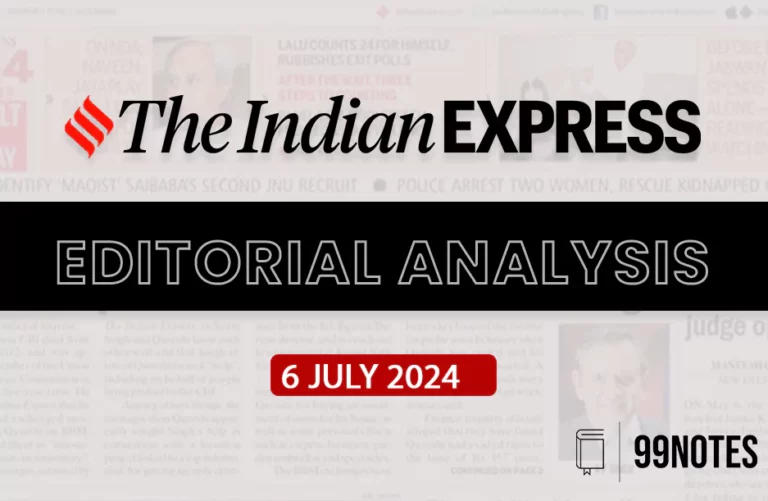30 Jan 2024 : Indian Express Editorial Analysis
Indian Express Editorial Analysis
30- January-2024
1. INTERIM TAKEAWAYS
| Topic: GS3 – Indian Economy – Government Budgeting This topic is relevant for both Prelims and Mains in the context of knowing facts about upcoming interim Union Budget for 2024-25. |
| Context: |
|
More about the news:
Growth Expectations:
- The budget is anticipated to reveal the government’s growth projections for the fiscal year.
- While the last budget assumed a growth rate of 10.5% (nominal) for 2023-24, recent estimates suggest a slower growth of 8.9%.
- The Finance Ministry’s report suggests a more conservative estimate of 7% growth in the coming year, driven by robust domestic demand and supply-side measures.
- The report reaffirms India’s aspiration to become the world’s third-largest economy with a $5 trillion GDP in the next three years and aims for a $7 trillion economy by 2030.
Fiscal Consolidation:
- A critical aspect to watch is whether the government will adhere to its fiscal consolidation path.
- The Centre has successfully reduced the fiscal deficit from 9.2% of GDP in 2020-21 to 6.4% in 2022-23.
- Analysts expect the deficit target of 5.9% to be met this year. Sticking to the consolidation path, as outlined by the Finance Minister in 2021-22, implies a significant reduction in the deficit over the next two years, reflecting the government’s commitment to fiscal prudence.
Capital Spending:
- In recent years, the government has increased its capital spending to stimulate private sector investments.
- Public sector capital expenditure has surged from Rs 5.6 lakh crore in 2014-15 to Rs 18.6 lakh crore in 2023-24, marking a remarkable 3.3 times increase.
- The question arises whether this momentum in public capex will be sustained in the coming year, considering the potential impact of upcoming national elections.
Political Compulsions vs. Long-Term Reforms:
- Given the proximity of national elections, there are expectations of a targeted focus on specific constituencies such as youth, farmers, and women.
- While political considerations may influence immediate priorities, the report emphasizes the importance of implementing long-term reforms in areas like skilling, education outcomes, and healthcare.
- Striking a balance between short-term political imperatives and sustained economic growth remains a key challenge.
Conclusion:
- The interim budget will serve as a crucial indicator of the government’s economic outlook, growth aspirations, fiscal discipline, and the approach to addressing immediate challenges while laying the foundation for sustained economic development.
- Balancing short-term political considerations with long-term reform agendas will be imperative for fostering a high-growth trajectory.
| PYQ: One of the intended objectives of Union Budget 2017-18 is to ‘transform, energize and clean India’. Analyse the measures proposed in the Budget 2017-18 to achieve the objective. (250 words/15m) (UPSC CSE (M) GS-3 2017) |
| Practice Question: Analyze how political considerations, especially in the run-up to national elections, may influence economic policies and the sustainability of growth in the coming years. (200 words/12.5 m) |
2. NO LOOKING AWAY
| Topic: GS2 – International Relations – Important International institutions Relevancy for Prelims: Genocide, International Court of Justice and UN Relief Agency. Relevancy for Mains: International Court of Justice (ICJ) Ruling- Significance and Challenges. |
| Context: |
|
More about the news:
About the International Court of Justice (ICJ) Ruling:
- Ruling Response to South Africa’s Case: The ruling is a response to a case filed by South Africa, holding Israel accountable for violations of humanitarian law. The ICJ accepted South Africa’s standing and found the preliminary submissions credible.
- High Degree of Consensus: 15 out of 17 judges favored provisional measures, showing a high degree of consensus.
- Preventing Conditions: Prevents conditions for eliminating Palestinians.
- Legal Obligation: Legally binds Israel to allow access to Gaza.
- Moral & Legal Indictment of Israel’s Actions: The ruling is a moral and legal indictment of Israel’s military actions, including bombing health facilities, designated safe zones, and densely populated areas. It aims to prevent conditions that can bring about the physical destruction of Palestinians.
- Ensuring Compliance and Progress Monitoring: The order makes it difficult for Israel to deliberately not comply. The world community should ensure Israel complies and critically monitor progress.
- Suspension of Global Aid to UN Relief Agency (UNRWA): The suspension of UNRWA in Gaza is concerning. This happened soon after the ruling based on Israel’s claims against some staffers.
- Necessary Investigation: A probe into UNRWA staffers is necessary but should not defund humanitarian work. The needs of the people of Gaza are vital right now.
Conclusion:
- Despite the absence of an explicit call for a ceasefire, the ruling is a momentous one that binds Israel to its obligation to prevent acts of genocide in its ongoing military operations in Gaza.
- Monitoring compliance and meeting humanitarian needs is a need of the hour. All nations need to pressurize Israel to adhere with the rulings of ICJ.
- The ICJ’s interim judgment brings attention to the humanitarian situation in Gaza, challenges political alliances, and underscores the importance of accountability for potential violations of international law.
| International Court of Justice (ICJ) |
Powers and Functions: The Court may entertain two types of cases:
Composition:
|
| PYQ: ‘India’s relations with Israel have, of late, acquired a depth and diversity, which cannot be rolled back.” Discuss. (150 words/10m) (UPSC CSE (M) GS-2 2018) |
| Practice Question: Evaluate the significance of the recent interim judgment by the International Court of Justice on Israel’s actions in Gaza, in upholding human rights principles and its potential impact on the resolution of the conflict in the region. (250 words/15 m) |
For Enquiry

13 Feb 2024 : Daily Current Affairs Quiz

13 Feb 2024 : Daily Answer Writing

13 Feb 2024 : Daily Current Affairs

13 February 2024 : The Hindu Editorial Notes PD

13 Feb 2024 : Indian Express Editorial Analysis

13 February 2024 : PIB Summary for UPSC

12 Feb 2024 : Daily Current Affairs Quiz

12 Feb 2024 : Daily Answer Writing

12 Feb 2024 : Daily Current Affairs

12 Feb 2024 : Indian Express Editorial Analysis
Daily Quiz 13 Feb 2024 : Daily Current Affairs Quiz 13 Feb 2024 : Daily Quiz…
mains answer writing 13 Feb 2024 : Daily Answer Writing Mains Answer Writing
13-February-2024
Q1) With the help of a map, show major ocean currents of the world….
Daily Current Affairs 13 Feb 2024 : Daily Current Affairs Daily Current Affairs
13-February-2024- Top News of the Day
1. Indian Navy Personnel Released from Custody…
Feb 2024 The Hindu 13 February 2024 : The Hindu Editorial Notes PD The Hindu Editorial
13-February-2024
1. A global alliance to bridge the gender equity gap
Topic:…
Indian Express 13 Feb 2024 : Indian Express Editorial Analysis Indian Express Editorial Analysis
13-February-2024
1. A science for us
Topic: GS2 – Governance…
feb 2024 PIB 13 February 2024 : PIB Summary for UPSC PIB Summary for UPSC
13-February -2024
1. Union Minister G Kishan Reddy inaugurate regional centre…
Daily Quiz 12 Feb 2024 : Daily Current Affairs Quiz 12 Feb 2024 : Daily Quiz…
mains answer writing 12 Feb 2024 : Daily Answer Writing Mains Answer Writing
12-February-2024
Q1) “Water scarcity threatens economic and social gains…
Daily Current Affairs 12 Feb 2024 : Daily Current Affairs Daily Current Affairs
12-February-2024- Top News of the Day
1. Great Indian Bustards give Nandyal a…
Indian Express 12 Feb 2024 : Indian Express Editorial Analysis Indian Express Editorial Analysis
12-February-2024
1. CLASSROOM VS COACHING
Topic: GS2 – Social…




